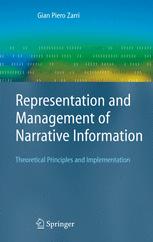

Most ebook files are in PDF format, so you can easily read them using various software such as Foxit Reader or directly on the Google Chrome browser.
Some ebook files are released by publishers in other formats such as .awz, .mobi, .epub, .fb2, etc. You may need to install specific software to read these formats on mobile/PC, such as Calibre.
Please read the tutorial at this link: https://ebookbell.com/faq
We offer FREE conversion to the popular formats you request; however, this may take some time. Therefore, right after payment, please email us, and we will try to provide the service as quickly as possible.
For some exceptional file formats or broken links (if any), please refrain from opening any disputes. Instead, email us first, and we will try to assist within a maximum of 6 hours.
EbookBell Team

4.3
38 reviewsA big amount of important, economically relevant information, is buried within the huge mass of multimedia documents that correspond to some form of ‘narrative’ description.
Due to the ubiquity of these narrative resources, representing in a general, accurate, and effective way their semantic content – i.e., their key ‘meaning’ – is then both conceptually relevant and economically important. This book presents the main properties of NKRL (‘Narrative Knowledge Representation Language’), a language expressly designed for representing and managing, in a standardised way, the meaning of complex multimedia narrative documents. NKRL is a fully implemented language/environment that exists in two versions: a relational database-supported version and a file-oriented one. It constitutes probably the most complete and realistic effort realised so far to deal with the huge industrial potentialities of the narrative domain.
Written from a multidisciplinary perspective, this book not only supplies an exhaustive description of NKRL and of the associated knowledge representation principles, it also constitutes an invaluable source of reference for practitioners, researchers and graduates in domains that range over narrative theories, linguistics and computational linguistics, artificial intelligence, knowledge bases, information retrieval, ontologies and the semantic Web.